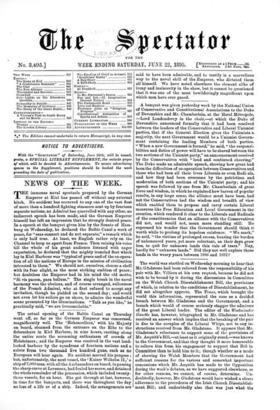A banquet was given yesterday week by the National Union
of Conservative and Constitutional Associations to the Duke of Devonshire and Mr. Chamberlain, at the Hotel Metropole, —Lord Londonderry in the chair,—at which the Duke of Devonshire announced formally that it had been resolved between the leaders of the Conservative and Liberal Unionist parties, that if the General Election gives the Unionists a majority, the next Government would be a Unionist Govern- ment containing the leading Members of both parties. " When a new Government is formed," he said, " the responsi- bilities and duties of power will have to be shared between the two sections of the Unionist party," an announcement received by the Conservatives with " loud and continued cheering." The Duke made an admirable speech, showing how great had been the difficulties of co-operation between Conservatives and those who had been all their lives Liberals or even RadL'als, and how they had been overcome by the patriotism and moderation of both sections of the Unionist party; and his speech was followed by one from Mr. Chamberlain of great force and wisdom, in which he explained how barren of popular results, in any large sense, the alliance must have been, had not the Conservatives had the wisdom and breadth of view which enabled them to propose and carry certain Liberal measures like Free Education and Local Government in the counties, which rendered it clear to the Liberals and Radicals of the constituencies that an alliance with the Conservatives did not, and would not, mean mere standing still. He expressed his wonder that the Government should think it worth while to prolong its hopeless existence. " We mark," he said, " the victims of prolonged excess, bearing the burden of nnhonoured years, yet more reluctant, as their days grow less, to quit for unknown lands this vale of tears." Nay, hardly for " unknown lands." Did they not well explore those lands in the weary years between 1886 and 1892 ?


































